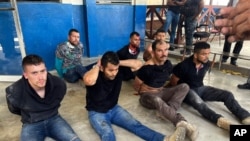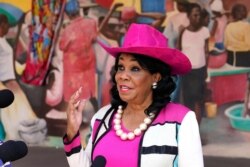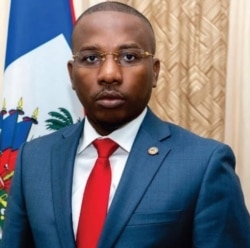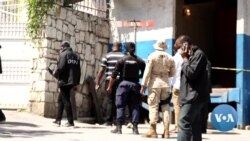WASHINGTON / PORT-AU-PRINCE, HAITI / MIAMI - Residents of the Jalousie slum in the Haitian capital say they discovered several of the alleged killers linked to the assassination of President Jovenel Moise and helped the national police to arrest them.
"We saw three guys appear in the neighborhood and they were asking us for information. One of the guys tried to fight us, so the residents of Jalousie banded together and we captured them, brought them down to the police station and handed them over," a Jalousie resident told VOA Creole on condition of anonymity. He said some of the men were naked and threw their weapons into the brush.
Another Jalousie resident who spoke to VOA Creole in front of the police station where the suspects are being held said they were easy to identify because of their skin color.
"The people of Jalousie, when we heard that the mercenaries were in our neighborhood - we went to look for them and we found them hiding in the brush," the man, who did not give his name, told VOA. "These guys came to our country because we are a small (nation) and they tried to overpower our legal system. I can tell you that as a young man, this is the first time I've ever experienced something like this. I only previously read about things like this in history books."
Another man who said he helped apprehend the foreigners said Jalousie residents are angry over the killing by foreigners of their president.
"It's our president they killed, so we couldn't just stand by and do nothing. He was the president of the Haitian people. This morning (Thursday) we helped police arrest four men, we want to make them talk (now) and we'll keep looking for the rest of them who are still hiding out there somewhere,” said the man. “We will turn them over to police. We want them to tell us who plotted with them to kill the president. We will search and find each and every one of them."
In custody
More than a dozen people have been detained in the assassination of Haitian President Jovenel Moise, officials said late Thursday.
Haitian authorities described a heavily armed hit squad of 28 "mercenaries,” made up of 26 Colombians and two Haitian Americans, involved in the killing of Moise, 53, at his private residence in a wealthy suburb of the capital, Port-au-Prince, before dawn on Wednesday.
Haiti National Police Director Leon Charles said Thursday that 17 men had been detained -- the two American citizens and 15 Colombians.
Charles said that three suspects had been killed and eight were still at large. Earlier, police had said four suspects had been killed. Neither Charles nor police officials explained the discrepancy.
"The pursuit of the mercenaries continues," Charles said. "Their fate is fixed: They will fall in the fighting or will be arrested."
Early Friday, Taiwan released a statement saying that 11 suspects were caught on the grounds of its embassy in Port-au-Prince after attempting to flee police.
"The police launched an operation around 4:00 p.m. (Thursday) and managed to arrest 11 suspects," the Taiwanese Embassy statement said.
Mathias Pierre, Haiti's minister of elections, Thursday identified the two Haitian Americans as James Solages, 35, and Joseph Vincent, 55.
The U.S. State Department has not confirmed the reports that two U.S. citizens are in detention.
Late Thursday, Colombia’s government confirmed that at least six of the suspects, including two of those killed, appeared to be retired members of the Colombian army. It did not identify the suspects.
Miami diaspora reacts
In Miami, U.S. Representative Frederica Wilson met with members of the Haitian diaspora in the Little Haiti neighborhood Thursday to discuss the Moise assassination.
“It frightens me to think that somebody would come into the president's home and murder him. I mean, who does that?! And how did they get in?" Wilson told VOA, adding that she was very pleased with the turnout.
Wilson expressed fear that the situation in Haiti will soon deteriorate and said the U.S. should take action.
"It's really the State Department who needs to act today because this is just the calm ahead of the storm and it's going to be real bad,” Wilson told VOA.
Over 200,000 Haitian Americans call the Miami-Fort Lauderdale-West Palm Beach, Florida area home, according to the Migration Policy Institute.
Haitian American activist Marleine Bastien, who heads the Family Action Network Movement, FANM, told VOA she was alerted to the news of the assassination in the early morning hours of Wednesday, when she began receiving phone calls.
"We are shocked, we are saddened because the fact that thugs were able to enter the president's home and assassinate him shows that no one is safe in Haiti,” Bastien told VOA in Creole.
She said going forward the diaspora has an important role to play in helping Haiti get back on its feet.
“Stay calm, don't participate in violence. Let's speak with one voice,” Bastien said, addressing Haitians back in her native land as well as the diaspora. “We need a council of government that can create a national dialogue, listen to voices from all sectors of society and develop a short-term and long-term strategy for the country. Haiti is a blessed country. Haiti has a global diaspora that loves the homeland. We have resources, we have competent people all over the world who are ready to pitch in to help rebuild Haiti. “
The need for a national dialogue was also expressed by Father Reginald Jean-Marie, who works at the Notre Dame Catholic Church in Little Haiti.
“There must be a national council, a council of wise people, who reflect all sectors of society who can name a group of serious people who can organize credible elections to lead Haiti out of this crisis,” Father Jean Marie told VOA. “That way, President Moise and all the other Haitians who have been killed will not have died in vain.”
The Haitian priest said the international community also has an important role to play in helping Haiti.
“The international community needs to be honest in its dealings and not just offer up a band-aid but effect real change. There is currently a constitutional vacuum plaguing the country. We see an acting prime minister making decisions – who had recently been fired, who had officially resigned, who had returned to his position as foreign minister – we know Haiti needs leadership, we thank Claude Joseph for stepping in to fill the void, but Haiti cannot go on like this,” Father Jean-Marie said.
Leadership vacuum
A day before his death, President Moise had named Ariel Henry, a Haitian politician and neurosurgeon, to replace Joseph as prime minister.
In a brief interview with the Associated Press, Henry claimed he was the prime minister, but he acknowledged it was an unusual situation.
Haiti's constitution says Moise should be replaced by the president of the country's Supreme Court, but the chief justice died recently from COVID-19.
Haiti is currently under a “state of siege,” announced by interim Prime Minister Joseph a few hours after President Moise’s assassination. An official decree issued Wednesday said the state of siege would be in effect for 15 days. In addition, the country’s border with the Dominican Republic and its airports are closed.
Brian Concannon, a human rights lawyer, a former United Nations human rights officer, and the founder of the Institute for Justice and Democracy in Haiti, told VOA that the state of siege allows police to do "anything necessary" in pursuit of the killers.
"Although almost everybody wants the police to pursue the killers effectively, there's great concern that this can be abused to round up political opponents," he said.
"There really is nothing — no structures to stop the government from arresting its political opponents under this decree."
The U.S. has pledged to help Haiti investigate the president’s assassination.
State Department correspondent Cindy Saine contributed to this report, which includes some information from The Associated Press, Agence France-Presse and Reuters.









